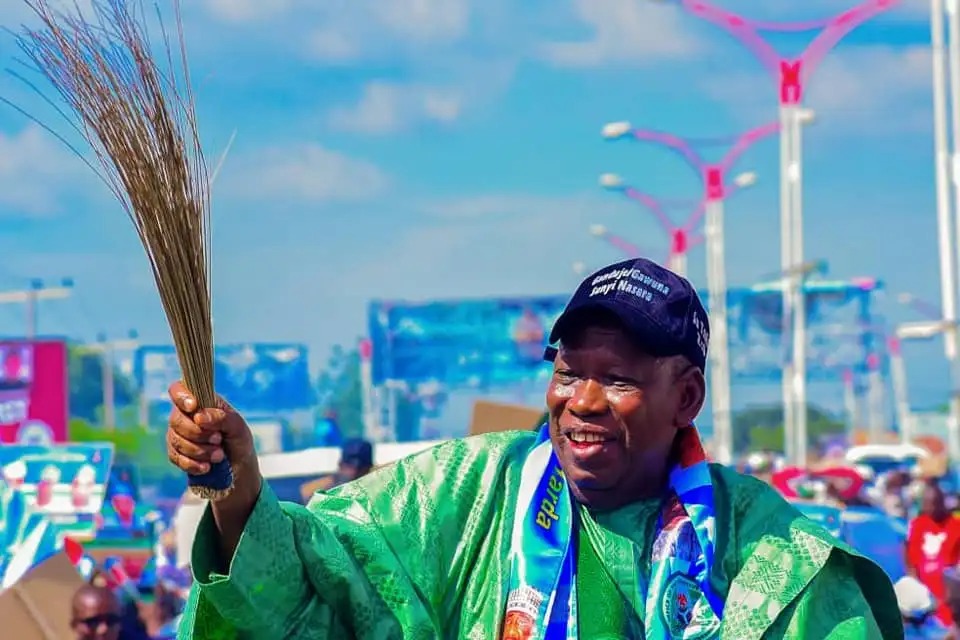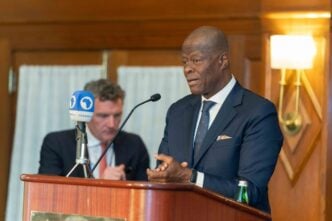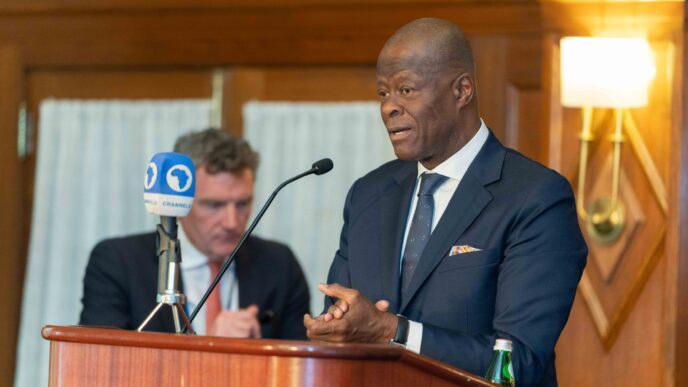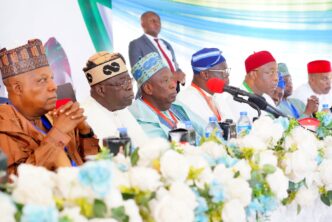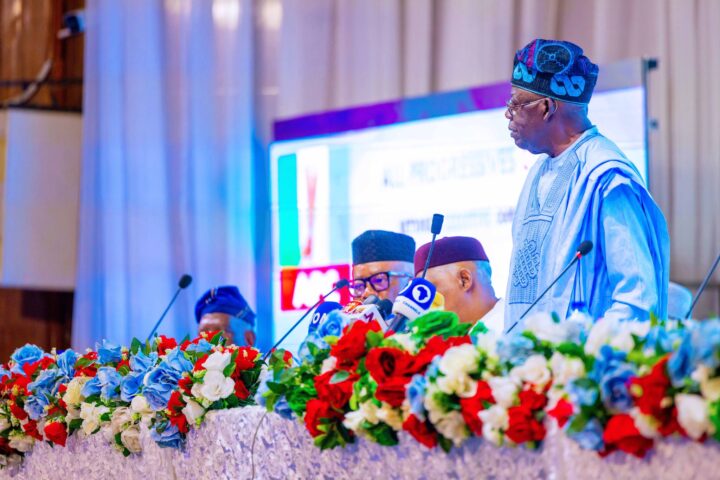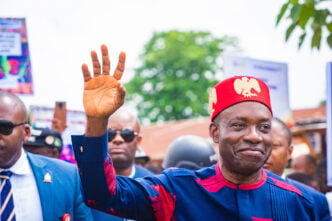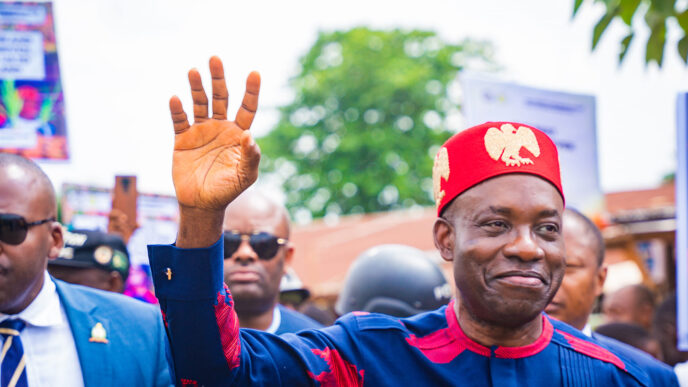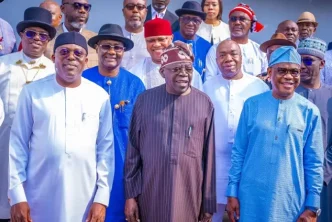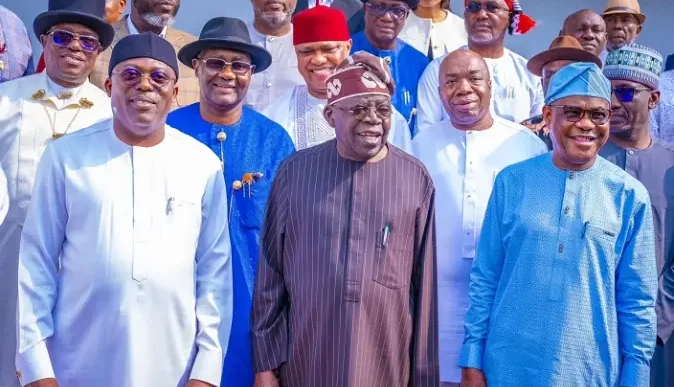Ganduje, the APC national chairman, says 2027 "is a done deal"
Governor Sheriff Oborevwori of Delta state has ended weeks of speculation by defecting to the All Progressives Congress (APC). It is significant: this is the first time Delta state would not be governed by the Peoples Democratic Party (PDP) since the dawn of the fourth republic in 1999. He has relocated to the APC with a number of key Delta politicians, including Dr Ifeanyi Okowa, his predecessor and — wait for this — Alhaji Atiku Abubabar’s running mate in the 2023 presidential election. (Okowa, may I remind us, is currently facing an EFCC investigation over allegations of mismanaging N1.3 trillion.) And we are hearing genuine rumours of more defections ahead.
With the exit of Delta, only Akwa Ibom, Bayelsa, Enugu, Rivers and Taraba states have now been governed by the PDP non-stop since 1999. The former ruling party now controls only 10 states, trailing the APC which has a massive 23. The Labour Party (LP), the New Nigeria People’s Party (NNPP) and the All Progressives Grand Alliance (APGA) have one each. Wow, how are the mighty fallen! At the height of its power, the PDP controlled the entire south minus Lagos state. In fact, only Lagos, Borno and Yobe states have never been governed by the PDP. In the 2007 governorship election, the PDP won 27 states — before losing four in court and gaining four via defections.
If my memory serves me right, Alhaji Abubakar Rimi was the first governor in our history to defect. He left the People’s Redemption Party (PRP) for the Nigerian People’s Party (NPP) in May 1983 after a prolonged face-off with the party leadership over ideological issues. In a rare display of honour, Rimi said he could not continue as Kano state governor having left the party that sponsored him to office, so he resigned. His deputy, Alhaji Abdu Dawakin Tofa, replaced him. Regrettably for Rimi, he lost the August 1983 governorship election to Alhaji Sabo Bakin Zuwo, who flew the PRP flag. (NB: Zuwo thereafter removed all the emirs installed by Rimi. Some things never change in Kano, do they?)
Oborevwori’s defection to the APC has reignited the debate on the health of our democracy. Many have expressed worries over Nigeria’s possible descent into a one-party state. This is generally considered to be antithetical to competitive democracy and a dangerous invitation to dictatorship. The one-party debate has dominated African discourse for decades. Many African leaders, such as Kwame Nkrumah (Ghana), Olusegun Obasanjo (Nigeria), Gnassingbe Eyadema (Togo), and Julius Nyerere (Tanzania), supported one-party system as the antidote to division in the body politic and as a catalyst for building national consensus. It brings everyone under one umbrella “by fire by force”.
Advertisement
I do not support the one-party system. While I admit that it has worked in socialist countries such as China and Vietnam where human and economic development has also been on the up, the same thing cannot be said of Cuba, Eritrea and North Korea which are nowhere near the prosperity recorded in China and Vietnam. This should raise questions as to what is really driving the success stories of China and Vietnam: is it the one-party system or something else? Since most of the flourishing countries in the world — going by quality of life and shared prosperity — run multi-party democracies, I am not sure we can credit one-party system with promoting peace and progress.
My position is that in a plural society, a multiparty system is desirable. Nigeria is made up of over 250 ethnic groups, two major religions, 36 states and six geo-political zones, north and south. Forcing everyone into one party may indeed create “peace” and “unity” as the promoters argue, but it may be the kind of peace you find in the graveyard. I like competition — competition of ideas. I like a race to the top — a race to win the hearts of the voters with alternative policy offerings. I like people having options and choices. Every system is flawed but I can live with the inadequacies of the multiparty system. Dozens of democracies have abandoned one-party system in the last 30 years.
But as Mr Felix Morka, the APC national publicity secretary, has aptly said, it is not the responsibility of the ruling party to strengthen the opposition. You cannot blame the APC for wooing opposition figures. You should blame the opposition politicians for having weak convictions. It is so easy for you to be in one party at breakfast, move to another at lunch and return “home” at dinner. When a party loses a state, within weeks the new party inherits its members and supporters. A state that was fully PDP yesterday can become wholly APC tomorrow. The situation is made worse by the use of federal might to whip certain politicians into line. In the end, many people care only about political survival.
Advertisement
We still need to be reminded that many of those we call APC “chieftains” today were once among the most powerful politicians in the PDP. In fact, the current national chairman of the APC, Dr Abdullahi Ganduje, was a founding member of the PDP and was deputy governor to Dr Rabiu Musa Kwankwaso from 1999-2003 and 2011-15. He defected with Kwankwaso to the APC in 2013. Many past and present APC governors were in the PDP. Some PDP politicians were once in the APC as well. Many politicians have changed parties thrice. In the real sense, therefore, many politicians change their jerseys out of political expediency. Politics is, in any case, about interests. The rest is a packaging.
What then? There are so many issues that come with defections that should not be deflected. For one, it is now very clear that defection has become part and parcel of our political culture. We do not need to run away from it. Every democracy evolves with practice. Despite constitutional provisions and court rulings (some of them contradictory), politicians have continued to move from one party to the other and continued to retain their elective positions. We should just stop deceiving ourselves. Let us expunge the constitutional restraints. Nobody is obeying the law. No defector has lost a seat or a position. Let us face the reality and amend our laws accordingly. Nigerians love defection. Simple.
Two, opposition politicians are deflecting the real issue by lamenting that the APC is turning Nigeria into a one-party state. Lamentation does not help anybody. Opposition parties used to lament about the PDP turning Nigeria into a one-party state from 2003 till 2013. I recall constantly writing that the parties must unite. The lamentations changed nothing until the opposition figures finally came to their senses, buried selfish ambitions and worked for a common purpose: wresting power from the PDP. Presenting a strong, united front against the PDP created the greatest political upset in our history in 2015. This is a tested and trusted template but all I can hear today are mere lamentations.
Three, may I further argue here that these defections are deflecting, or distracting, our attention from another major fact about elections in Nigeria: that a governor does not always determine the presidential candidate that the people will vote for. There seems to be an assumption that once the governor of a state defects or backs a candidate, the voters will sheepishly follow his route. Yes, governors are powerful. They build, control and fund structures. That is critical to winning an election. However, there have been instances when governors could not deliver their states to their preferred presidential candidates. In fact, a sitting governor can be voted out. The evidence is there.
Advertisement
As recently as 2023, Delta was under a PDP governor who was also his party’s vice-presidential candidate, but the people voted for Peter Obi, candidate of the LP. Fact. The Lagos governor could not deliver the state to his party’s presidential candidate, Asiwaju Bola Tinubu. Fact. Same trend was recorded in Edo, Cross River and other places. Tinubu and Atiku also won in states under the control of other parties. I am saying there are several factors that determine who the citizens cast their votes for, but the preponderant opinion appears to be that the 2027 presidential election is done and dusted. Ganduje has said as much. May I go against the grain by saying nothing is settled yet.
I am very much aware that the opposition is in disarray. Perhaps this is driving the narrative that 2027 is over before it has even started. This is a very strong argument. After doing an extensive analysis of the 2023 presidential election, I came to the conclusion that the APC won because the opposition was divided into three. The votes that used to go to the PDP in at least 10 states went to the LP. According to results posted on the much-derided IReV portal, the APC polled 8,794,726 votes while the PDP, the LP and the NNPP had 14,582,740 combined. Do the math. The details are still there on the portal. The opposition won in 2015 by coming together, not by drifting apart. Fact.
There are at least two models of galvanising voters before an election. The party-led model of 2015 was a culmination of a series of factors: united opposition, vote-pulling candidature and a movement of disenchanted voters. This turned out to be a winner. There was also the movement-led model of 2023 built on vote-pulling candidature. Although, the APC had enough time to plan for 2015, we saw in 2023 that you do not need all the time and the money to galvanise the streets. The movement gained momentum but did not have the numbers to cause an upset. However, we saw the potential. While I cannot say whether or not Tinubu will be defeated in 2027, I know that the day is still young.
AND FOUR OTHER THINGS…
GORING GOMBE
Advertisement
Gombe is one northern state I celebrate as a role model for religious tolerance and accommodation. In terms of religious demographics, Gombe is a mirror image of Kaduna state — minus the resentment and bloodbath. However, something has been happening in Gombe that may potentially change the narrative of peaceful co-existence. For the third time in six years, a vehicle plunged into a Christian procession last week. It happened in April 2019, December 2024 and now April 2025. In the words of James Bond, once is a happenstance and twice is a coincidence. But thrice? That is enemy action. I appeal to the authorities to take this as a serious matter. Delay is dangerous. Troubling.
WANTED DREAD & ALIVE
Advertisement
Governor Umar Bago of Niger state on Tuesday ordered security operatives to arrest persons with dreadlocks in Minna, the state capital. “Anybody that you find with dreadlocks, arrest, barb the hair, and fine the person,” the governor said. “Nobody should carry any kind of haircut inside Minna.” And the people at the meeting clapped for him! They probably don’t know that some people are born with locks. Bago’s attempt to back down may not work, going by the culture of our security agencies. Do we still remember the trigger for the #EndSARS unrest? Police profiled anyone with tattoo and dreadlocks as scammers. We know how it ended. We don’t ever learn anything in Nigeria. Pathetic.
RENEWED HOPE
Advertisement
Sir Siminalayi Fubara, the suspended governor of Rivers state, reportedly met with President Tinubu in the UK last weekend, after which he issued a statement calling on Riverians to rally behind the president’s “renewed hope agenda”. In his Easter message, Fubara said the season “represents a time for reconciliation and unity”. A lot of people were angry with him but I was not. I have lived long enough in this country to know that, in the words of Bolaji Abdullahi, Nigeria will always defeat you. It doesn’t matter whether you are right or wrong — whoever controls the military controls the country. It seems Fubara realised this fact too late and has now opted to renew his hope. Helpless.
NO COMMENT
Advertisement
Mr Shamseldeen Ogunjimi, accountant-general of the federation (AcGF), told the National Economic Council (NEC) on Thursday that the excess crude account (ECA) — set up in 2004 by President Obasanjo to save the difference between the budget price for oil and the actual price — now holds exactly $473,754. You won’t understand. When President Yar’Adua died in May 2010, he left $20 billion in ECA. President Jonathan assumed power and governors pressured him to share the money ahead of the 2011 elections, declaring that ECA was “unconstitutional”. By 2015, we had only $2 billion left. And in 2025, it is now less than half a million dollars. Enough to buy peanuts. Hahahaha.

